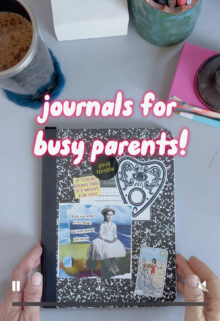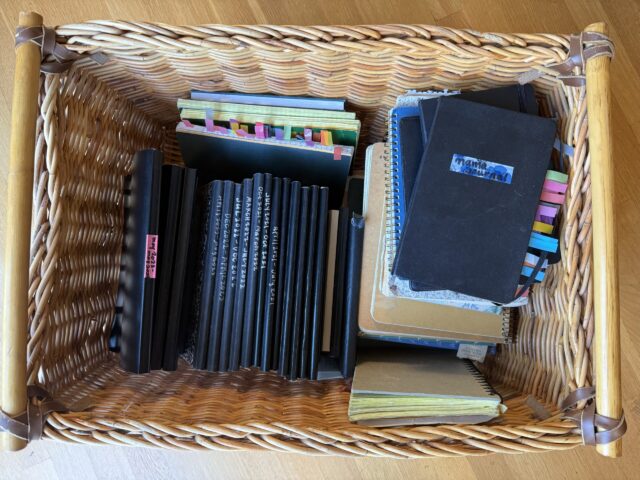That basket is bigger than it looks.
50+ journals in there. Cherished items, ready to grab in case of fire.
Dear fellow wonderer,
I’ve been thinking about how a weird and fun question to ask people upon meeting would be, “Do you keep a journal?” Maybe it’s too personal–but I want to know!
I’ve been keeping journals consistently since I was in college, but I’ve often felt it was a writerly quirk. I’m a word person and just wired that way.
But recently I made a little ten-second video about my Lynda Barry-style daily diary, thinking it could be a fantastic format for busy parents who long to keep some sort of journal. After viewers asked for details, I made a follow-up video showing how I do it.
I didn’t expect the videos to get much traction, but they kinda took off on TikTok. Hundreds of folks saving the videos as if they have journaling intentions. Five different commenters using the word amazing.
Interesting, huh? I have suspicions about what’s going on here.
* * *
I’ve always had a straight-up journal where I natter on. Once I had kids, I also started keeping a mother’s journal–intermittently–about what they were doing, funny things they said. I wrote about those journals once upon a time, a few weeks before my daughter left for college on the opposite coast. (Oh man, rereading that pummels me in the heart.)
A snippet from that 2014 piece:
I’ve written in them sporadically–sometimes every few weeks, sometimes every few months. I always wished I’d written more, but it’s surprising how much even occasional entries add up. My current mother’s journal is a Moleskine with grid pages–thin pages and small lines means you can cram a lot in. I started this one in 2003! My 10-year-old has turned into a 22-year-old in this journal! There is a page mid-way, with pencil scrawls from Mr. T that he must have done when he was two. I didn’t write my way to that page for another ten years; I finally got there this March. I wrote around his two-year-old scribblings about the twelve-year-old he’d become, with a his fascination with the Medici and the Illuminati, and his tendencies to be less of a maker and more of a talker.
Let us not consider that the written-about twelve-year-old turns 24 in less than a week. Pummel, pummel.
* * *
In 2016, I fell hard for Lynda Barry’s Syllabus and started keeping the style of diary she suggests in those pages. If you’re interested, you can see what that looks like for me, here:

watch on Instagram, TikTok, or Substack.
Again, I was intermittent about keeping this style of diary until 2021, when I started guarding my morning time, hoarding it for myself, inspired by Austin Kleon and Patricia Lockwood and synchronicities in the ether.
I know that most people, busy parents especially, don’t have this kind of time in the morning. I sure didn’t back in the day. Still, keeping the Lynda Barry-style diary solidly for the past few years has taught me a few things.
* * *
But first, let me tell you about my regular ol’ journal. (Snort. Who keeps multiple journals like this? My friend Kolina for one–and she does have young kids!)
Oh, Lord. I went looking back through old blog posts to find one about how I turned my irregular rambling journal pages into morning pages and there was another post from 2021 when I started up this daily practice, and below it was a comment I’d forgotten about from my dad, two years before he died. Holy crap, I’m just trying to write a newsletter and I can’t stop weeping!
Let that be a reminder about why putting down words matters. They remain. They help us remember.
Anyway–I’ve got myself back together now–I started keeping morning pages around this time and rest assured, this is not a post about why you should keep morning pages, which, if you follow the guidance of their originator, Julia Cameron in her classic The Artist’s Way, means freewriting every morning for a full three pages, which is a practice that might terrify anyone with a budding interest in journaling, so I will not do that to you.
But! I want to tell you what started happening in my journal once I started writing daily, typically about two pages, not three. (My journal is large, the lines closely spaced, my defense.) Many days, about a page and a half in, my hand starts writing something I hadn’t seen coming, something I hadn’t been thinking, something that hits me as absolutely true. Something simmering there in my unconscious gets pulled forth on the page by my hand.
That’s right. My intuition shows up, baby.
* * *
Maybe you remember a couple newsletters back when I said I worry that it’s harder than ever these days for parents to hear their intuition. Mothers especially. If you’re curious about why that is, here’s a little explainer video if you’re on TikTok, or a related one on Instagram and Substack.
There is simply so much more noise about how parents should be parents–and especially how mothers should be mothers.
And here came Austin Kleon again (love him!) talking about writing newsletters. About 48 minutes into the interview, he’s chatting about what happens when we scroll too much. “It’s just input, input, input and there’s no output,” he says. “You’re full of all this stuff. You’ve had no time to process it.”
But how do you have time to create output if you’re a busy person–especially a busy parent?
Enter the Lynda Barry-style diary. This is a format designed to take just a few minutes a day. (I’ve seen it referred to as a 4-minute diary, a 5-minute diary, a 7-minute dairy. Whatever. It’s fast.) I like to set mine up in the morning and add to it throughout the day. If I don’t finish it, I complete it the next morning–or I don’t. That’s okay!
In a comment, a mom said she’d like to do this as a way to remember her kids’ lives and I love that idea–but I encouraged her to maybe write about her kids in a different-colored pen, so she can identify those bits later, but also to write about what she does and sees and hears, beyond her kids. We are more than our mom-selves, dear friends who are moms, and a journal is a perfect place to keep those other selves alive.
The Lynda Barry-style journal is great because it’s doable and it helps you pay attention to the life around you. It also gives you a record of your days. You would not believe how often over the past five years, I’ve pulled out an old diary to check on some random thing.
(I do think the long, morning pages-style freewrite is an almost magical way to allow your intuition to show up on the page. Even if you can’t manage it on a daily basis, maybe try it once in a while, especially if you’re feeling out of touch with yourself, or looking for an answer to something.)
But even the quicker diary is an antidote to input, input, input. It allows you to process your life and if you want to hear your intuition, well, that’s a good place to begin.
* * *
I suspect that all those folks liking and saving my journaling posts on TikTok are feeling a call to move away from their phones and toward something tangible.
There’s a section in the first chapter of my manuscript where I pick up a fateful brochure at the library. Here’s a line from my draft: “This was 1996, remember. We still got information from pieces of paper.”
In my writing group, someone responded, “I have a real nostalgia for the days of learning from paper.”
I think many of us do! Journals: a way to learn from paper–about yourself. And an excellent curative for all the ruckus coming in.
Do you keep some sort of journal? Do you want to? I’d love to hear!
xo,
patricia
P.S. If you’re in the Bay Area, I’ve kicked off a FREE monthly morning reading series for caregivers at the very cool new Oakland community space, Local Economy. Modeled after a traditional library story time, but with a new twist: the books are for the grown-ups! Each month I’ll be in conversation with a writer of fiction or nonfiction with a caregiving theme. They’ll read briefly, we’ll all chat, and they’ll end with a book for the younger crowd. After the one-hour event, we’ll have time for an IRL hang-out: a goal of this series!
Babies entirely welcomed but not required.
Our first reading with Elissa Strauss was magic. Can’t wait to chat next with Ruth Whippman about Boymom: Reimagining Boyhood in the Age of Impossible Masculinity. November 12, (new time!) 10:00-11:00 Register here!
Cross-posted at Substack.

